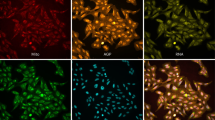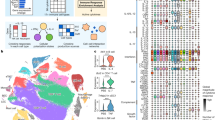Abstract
Studies of EMT6 mouse tumour cells growing in vitro have shown that these cells become less sensitive to bleomycin as they pass from exponential growth into stationary phase. This result is the opposite of that recently reported by two other groups of workers using different cell systems, but in agreement with the results of a third group of workers. Results for 1,3-bis(2-chloroethyl)-1-nitrosourea, however, confirm the findings of other workers that cells become more sensitive to this agent as they pass into stationary phase.
These findings are discussed with particular reference to discrepancies which appear to exist between various cell systems.
This is a preview of subscription content, access via your institution
Access options
Subscribe to this journal
Receive 24 print issues and online access
$259.00 per year
only $10.79 per issue
Buy this article
- Purchase on Springer Link
- Instant access to full article PDF
Prices may be subject to local taxes which are calculated during checkout
Similar content being viewed by others
Rights and permissions
About this article
Cite this article
Twentyman, P., Bleehen, N. The Sensitivity of Cells in Exponential and Stationary Phases of Growth to Bleomycin and to 1,3-bis(2-chloroethyl)-1-Nitrosourea. Br J Cancer 28, 500–507 (1973). https://doi.org/10.1038/bjc.1973.179
Issue Date:
DOI: https://doi.org/10.1038/bjc.1973.179
This article is cited by
-
Zum Problem der pr�therapeutischen Sensibilit�tsbestimmung von Tumoren durch Inkorporationsstudien in vitro
Klinische Wochenschrift (1977)



